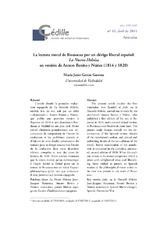La lectura moral de Rousseau por un clérigo liberal español: La Nueva Heloísa en versión de Antero Benito y Núñez (1814 y 1820)
Autor
García Garrosa, María Jesús
Editor
UCOPressFecha
2014Materia
La Nueva HeloísaRousseau, Jean-Jacques, 1712-1778
Benito y Núñez, Antero
Traduction
Pensée libérale espagnole
Guerre d’indépendance espagnole
Julie, ou la Nouvelle Héloïse
Translation
Spanish liberal thought
Spanish Peninsular War
METS:
Mostrar el registro METSPREMIS:
Mostrar el registro PREMISMetadatos
Mostrar el registro completo del ítemResumen
L’article aborde la première traduction espagnole de La Nouvelle Héloïse, réalisée lors de son exil par un abbé « afrancesado », Antero Benito y Núñez, qui publie une première version à Bayonne en 1814 et une deuxième à Bordeaux et Madrid six ans plus tard. Notre travail s’intéresse premièrement aux circonstances de composition de l’oeuvre (le traducteur et les problèmes textuels et d’édition de cette double présentation du roman) pour se diriger ensuite vers l’étude de la traduction dans cette deuxième édition, complète et avec des notes de lecture, de 1820. Notre analyse montrera que la vision morale qu’un ecclésiastique à l’esprit éclairé et libéral porte sur le roman de Rousseau met en valeur l’aspect philosophique qu’en tant que traducteur il veut présenter aux lecteurs espagnols. The present article studies the first translation into Spanish of Julie, ou la Nouvelle Héloïse, carried out in exile by the pro-French Antero Benito y Núñez, who published a first edition of the text in Bayonne in 1814, and a second revised versión in Bordeaux and Madrid six years later. The present study focuses initially on the circumstances of the Spanish version (details of the translation's author, and textual and publishing details of the two editions of the novel), before examination of the translation as contained in the complete, annotated, second edition of 1820. What this analysis reveals is the moral perspective which a priest with enlightened ideas and liberalizing views wished to present to Spanish readers of the philosophical vision which in his view was present in the work of Rousseau.

